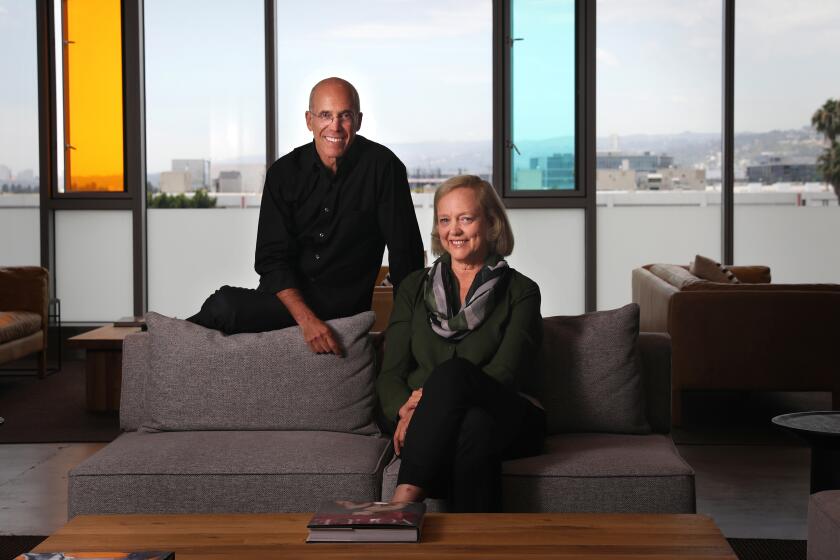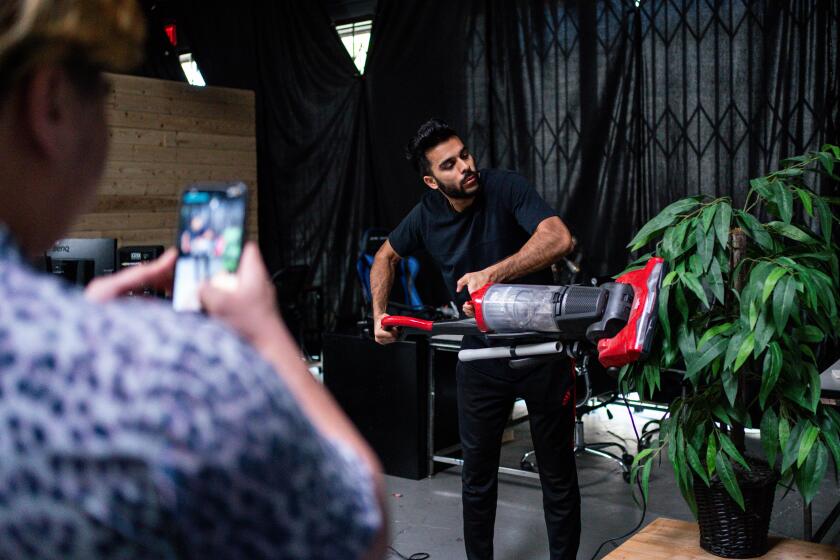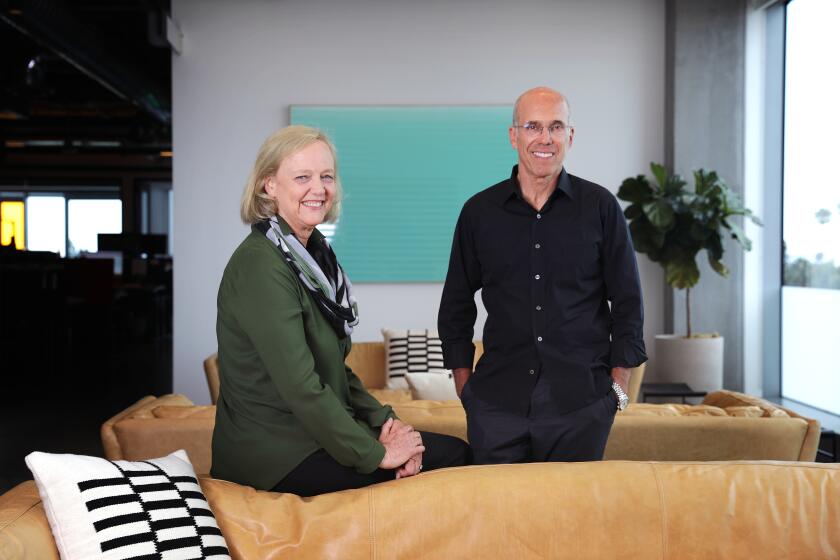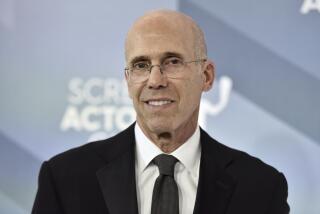Quibi was supposed to be a haven for creatives. Then it shut down
- Share via
As Jeffrey Katzenberg and Meg Whitman prepared to launch their streaming service Quibi, the powerhouse executives pitched it as a happy home for filmmakers to bring their short-form shows and movies. The company was what every producer wants to see in Hollywood — a big-spending new buyer hungry for fresh material.
Best of all, creators would be able to retain ownership of their projects, a potentially attractive deal given the demand for content in the streaming era.
“Our deal is one of the most attractive deals that anybody can [get] today,” Katzenberg said at a 2018 industry event.
But after Quibi’s sudden collapse, announced this week, showrunners and studios are left scrambling to figure out what to do with the productions they’ve spent months developing for the platform, which now do not have an obvious home.
News outlets including NBC News, Telemundo and CBS’ “60 Minutes” dedicated staff to creating Quibi’s “daily essentials” programming specifically for its unusual “quick bites” format. Fictional shows written to fit Quibi’s formula will have to be rewritten before they can sell to another streamer. Quibi’s movies — broken into 10-minute or less chapters, each with a beginning, middle and cliffhanger end — will be even more challenging, if not impossible, to pitch elsewhere.
“If you don’t have high-level talent attached, you’re done, because the market is going to be flooded,” said one producer with a show at Quibi who was not authorized to comment publicly. “It’s going to be luck of the draw.”
The streaming service launched by Jeffrey Katzenberg and Meg Whitman failed to gain traction following its launch in April.
Quibi raised $1.75 billion for its charge into the growing streaming market from major Hollywood studios including Walt Disney Co. and others such as China’s Alibaba Group, JPMorgan Chase & Co. and Madrone Capital. The major studios invested $25 million each with the agreement that Quibi would buy their programming.
Barely more than six months after its April launch, Quibi told investors on Wednesday that is will shut down and sell off assets. Though the Hollywood-based company had enough money to keep going for longer, Katzenberg decided to pull the plug to avoid losing more money for investors.
“Given how much money they had raised, no one knew the end was quite so near,” said an executive involved in one Quibi show who was not authorized to comment. “It’s disappointing.”
The company has $350 million in cash that it will distribute to investors, leaving creatives who’ve worked with the service to wonder how, when and if they’ll get paid. It is also unclear if Quibi will be able to sell its content library of shows to other companies.
Reactions to Quibi’s demise varied widely, ranging from sadness for the job losses to come at the 200-plus person start-up to I-told-you-so’s from those who’d criticized the strategy early on. Still others called for outsiders to stop kicking a company while it’s down.
Quibi, if nothing else, was a bold and risky bet that people would be willing to pay for short-form content when they can get it for free via YouTube and TikTok.
TikTok, a popular based social video app owned by China-based ByteDance, has seen explosive growth this year amid the coronavirus crisis. The company has plans to hire more people, including at its Culver City office.
Evan Shapiro, a producer and former executive at NBCUniversal, sold a non-scripted Japanese game show-style series to Quibi in March when he was still president of National Lampoon.
From the start, he said, he saw problems with Quibi’s plan to launch without a library of existing content to draw viewers. Shapiro said Quibi took a top-down approach to decision-making, with Katzenberg, the former DreamWorks Animation and Walt Disney Studios leader, taking a hands-on approach.
“I think a lot of the strategy was based on his gut, and in fairness it’s hard to argue with his gut,” Shaprio said. “He essentially served as the head of programming there with a sort of iron grip on what content was made.”
Shapiro declined to comment on specifics surrounding his show, citing a non-disclosure agreement he signed. However, he said Katzenberg’s style could be frustrating to creatives and hampered Quibi’s chances to succeed.
The series, “Let’s Go Atsuko,” produced by National Lampoon, never got made. Rival streamers, including the much-larger Netflix, tend to delegate programming decisions much more, he said.
“It was very difficult to pinpoint what the voice of Quibi was, other than the man at the top,” Shapiro said.
More than two months after its launch, the much-hyped subscription service Quibi hasn’t lived up to its promise, analysts say.
Dan Rayburn, principal analyst at Frost & Sullivan called Quibi a “failure of management” that should be studied in business schools for decades.
“Quibi hired a lot of smart people and didn’t listen to them,” Rayburn said. “Quibi was blown up by egos. ... You’re going to tell consumers how to watch your content? You’re going to change consumer behavior?”
Quibi and its executives declined to comment for this article.
Company executives have said the pandemic impeded their plans to deliver content to people on the go.
“We’ve gotten great reviews from the app and maybe in a different time and in a different place, this would have worked better,” Whitman said in an interview with CNBC’s “Squawk Alley.” “But Jeffrey and I are realists and we’re mature executives and we really felt this was the right thing to do for our investors, the right thing to actually do for our partners and folks that had really helped us build this business.”
Some have jumped on social media to defend Quibi as an experiment that, if successful, could have introduced a new business model, but just didn’t work out.
Sujay Jaswa, co-founder of Katzenberg’s WndrCo, which was Quibi’s first financial backer, applauded Whitman and Katzenberg’s efforts in a Medium post in response to the “harshness” of the company’s critics.
“Despite having reached the business mountaintop, they started over, and poured every ounce of their energy and reputation into an unproven idea they believed in,” Jaswa said. “They are brilliant and good people, and I am proud to have backed their efforts.”
Shapiro, who was head of NBCUniversal’s short-lived Seeso comedy streaming service, said he wished the company had been more nimble by adapting its model in response to consumer demand and widespread criticism.
Instead, they “white-knuckled” on their plan for a mobile-only service. They also launched without functions to let viewers share clips and screenshots of Quibi shows, which might’ve helped people discover its programming through social media (Quibi later added sharing options).
“The team they assembled is some of the smartest, most talented people I know in the industry, and it’s a real shame that they didn’t have more time to execute on a larger strategy,” Shapiro said.
For many Quibi employees, working for the Hollywood start-up was the opportunity to be on the cutting edge of innovation. They left jobs at Fox, Snapchat and Google to create the new streaming app.
“If nothing else, in production we pivot!” wrote Andrew J. Nelson, a Quibi production coordinator on LinkedIn. Nelson, who previously worked at A+E Networks, declined an interview request.
Some supporters of the service, which officially ends Dec. 1, blamed the naysayers for never giving it the chance to thrive.
Paige Prevost, a content assistant for daily shows at Quibi, wrote on LinkedIn that “it became a favorite pastime of publications and of the Twitterverse to post deriding things just for the sake of being witty-personally.”
What she learned from working at the company was “failure is a perspective,” Prevost wrote.
Times Staff Writer Anousha Sakoui contributed to this report
More to Read
Inside the business of entertainment
The Wide Shot brings you news, analysis and insights on everything from streaming wars to production — and what it all means for the future.
You may occasionally receive promotional content from the Los Angeles Times.















